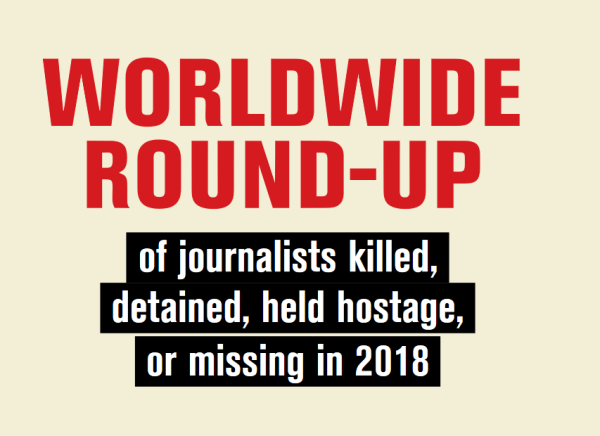RSF: Rhetorical Attacks on Media Help Fuel Real Ones

The smarter way to stay on top of broadcasting and cable industry. Sign up below
You are now subscribed
Your newsletter sign-up was successful
Violence against journalists has reached unprecedented levels, according to Reporters Without Borders (RSF), which thinks its has one of the answers. “The hatred of journalists that is voiced, and sometimes very openly proclaimed, by unscrupulous politicians, religious leaders and businessmen has tragic consequences," it says, "and has been reflected in this disturbing increase..."
For the first time the U.S. joined the ranks of the deadliest countries for journalists.
That came in RSF's annual report, which found that eighty journalists were either murdered or died in 2018 while doing their jobs, while another 348 were imprisoned or remained there and 60 were being held by non-state actors. The highest-profile killing was that of dissident Saudiand Washington Post journalist Jamal Khashoggi, who was murdered inside the Saudi consulate in Istanbul.
RSF also blamed online echo chambers for helping ramp up the violence by politicians and others. “Amplified by social networks, which bear heavy responsibility in this regard, these expressions of hatred legitimize violence, thereby undermining journalism, and democracy itself, a bit more every day," it said. It did not point any fingers at particular politicians, religious leaders of businessmen, though President Donald Trump, and the social media platforms that amplify him, have elsewhere been labeled a threat to journalist safety due to the President's constant slamming of mainstream media as enemies in league with his political opponents, criticisms more familiar in authoritarian regimes.
For example, before President Trump was elected, the Committee to Protect Journalists took the unprecedented step of declaring the Republican candidate a threat to press freedom "unknown in modern history."
Afghanistan was the deadliest country for journalists in 2018, with 15 killings, followed by Syria with 11, Mexico with nine, and Yemen with eight--Mexico was the deadliest country without an ongoing war. And the shooting of five Capital Gazette employees (four of whom were working journalists) in Maryland added the U.S. to the ranks of the deadliest countries, tied with India in fifth place. The other two U.S. deaths were a local TV anchor crew from Hearst's WYFF-TV Greenville killed last May when a tree fell on them as they were reporting on Subtropical Storm Alberto in North Carolina.
Also of note, for the first time since the 2003 Iraq War, there were not media-related casualties in Iraq.
The smarter way to stay on top of broadcasting and cable industry. Sign up below
The RSF figures do not include deaths still being investigated for the cause, so that number could eventually go up.
Contributing editor John Eggerton has been an editor and/or writer on media regulation, legislation and policy for over four decades, including covering the FCC, FTC, Congress, the major media trade associations, and the federal courts. In addition to Multichannel News and Broadcasting + Cable, his work has appeared in Radio World, TV Technology, TV Fax, This Week in Consumer Electronics, Variety and the Encyclopedia Britannica.

